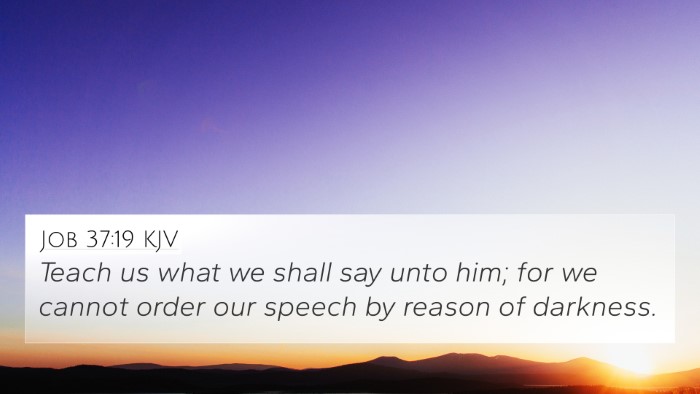Old Testament
Genesis Exodus Leviticus Numbers Deuteronomy Joshua Judges Ruth 1 Samuel 2 Samuel 1 Kings 2 Kings 1 Chronicles 2 Chronicles Ezra Nehemiah Esther Job Psalms Proverbs Ecclesiastes Song of Solomon Isaiah Jeremiah Lamentations Ezekiel Daniel Hosea Joel Amos Obadiah Jonah Micah Nahum Habakkuk Zephaniah Haggai Zechariah MalachiJob 6:3 Similar Verses
Job 6:3 Cross References
For now it would be heavier than the sand of the sea: therefore my words are swallowed up.
Uncover the Rich Themes and Topics of This Bible Verse
Listed below are the Bible themes associated with Job 6:3. We invite you to explore each theme to gain deeper insights into the Scriptures.
Job 6:3 Cross Reference Verses
This section features a detailed cross-reference designed to enrich your understanding of the Scriptures. Below, you will find carefully selected verses that echo the themes and teachings related to Job 6:3 KJV. Click on any image to explore detailed analyses of related Bible verses and uncover deeper theological insights.

Proverbs 27:3 (KJV) »
A stone is heavy, and the sand weighty; but a fool's wrath is heavier than them both.

Job 37:19 (KJV) »
Teach us what we shall say unto him; for we cannot order our speech by reason of darkness.

Psalms 40:5 (KJV) »
Many, O LORD my God, are thy wonderful works which thou hast done, and thy thoughts which are to us-ward: they cannot be reckoned up in order unto thee: if I would declare and speak of them, they are more than can be numbered.

Matthew 11:28 (KJV) »
Come unto me, all ye that labour and are heavy laden, and I will give you rest.
Job 6:3 Verse Analysis and Similar Verses
Understanding Job 6:3
Job 6:3 states, "For now it would be heavier than the sand of the sea: therefore my words are swallowed up." This verse reveals Job's overwhelming sense of despair and the heavy burden of his afflictions. It is an expression of the intensity of his suffering, illustrating how his anguish outweighs even the vastness of the sea.
Summary of Key Themes
- Intensity of Suffering: Job uses a metaphor comparing his grief to a weight greater than the sand of the sea, highlighting the enormity of his pain.
- Expression of Despair: His words are described as 'swallowed up,' indicating a feeling of being overwhelmed to the point of silence or incapacity to express his suffering effectively.
- Divine Dialogue: This verse fits within the larger context of Job's dialogues with his friends, where he continually seeks an understanding of his suffering from God.
Commentary Insights
Matthew Henry points out that Job's sorrow caused him to feel as if his words were of no value. The comparison emphasizes the tremendous burden he faces, indicating that speech is insufficient to convey the depths of his affliction.
Albert Barnes elaborates on Job's predicament as a human being grappling with immense pain. He notes that Job’s rhetorical lament demonstrates a profound spiritual battle; the weight of his trials was crippling and eclipsed all joy.
Adam Clarke observes that Job's agony is not merely physical; it's an emotional and spiritual crisis. Clarke notes that in this moment, Job articulates a common human experience of suffering and existential despair when faced with suffering without clear reasons.
Cross-References
To deepen understanding of this verse, consider these related verses:
- Psalm 38:4 - "For mine iniquities are gone over mine head: as a heavy burden they are too heavy for me."
- 2 Corinthians 4:17 - "For our light affliction, which is but for a moment, worketh for us a far more exceeding and eternal weight of glory."
- Psalm 55:22 - "Cast thy burden upon the Lord, and he shall sustain thee: he shall never suffer the righteous to be moved."
- Lamentations 3:19-20 - "Remembering mine affliction and my misery, the wormwood and the gall. My soul hath them still in remembrance, and is humbled in me."
- Matthew 11:28 - "Come unto me, all ye that labour and are heavy laden, and I will give you rest."
- Isaiah 53:3 - "He is despised and rejected of men; a man of sorrows, and acquainted with grief."
- Romans 8:18 - "For I reckon that the sufferings of this present time are not worthy to be compared with the glory which shall be revealed in us."
Thematic Connections
The thematical connections in Job 6:3 resonate throughout Scripture, particularly in how suffering is addressed. The parallel between Job's lament and New Testament teachings about burdens and affliction provides a cohesive dialogue on human pain and divine response.
Tools for Bible Cross-Referencing
Engaging in a cross-referencing Bible study can provide clearer insights into how different verses relate to each other. Here are some tools that can aid this exploration:
- Bible concordance
- Bible cross-reference guide
- Bible reference resources
- Comprehensive Bible cross-reference materials
Using Cross-References Effectively
Understanding how to use Bible cross-references enhances the interpretive journey. This method reveals connections between Old and New Testament themes, deepening one's comprehension of biblical teachings.
Example of Cross-Referenced Themes
- How to find cross-references in the Bible: Utilize a concordance or digital Bible app.
- Identifying connections: Study links between the Prophets and the Apostolic teachings.
- Cross-referencing Psalms: Relate insights gleaned from Psalms to New Testament interpretations.
Conclusion
Job 6:3 encapsulates profound themes of despair, the weight of suffering, and the human experience under divine scrutiny. Cross-referencing this verse with others enriches understanding and offers various perspectives on suffering, hope, and divine assurance.
By exploring the connections within the scriptures, readers can uncover deeper insights into both the text of Job and the collective wisdom of the Bible, expanding their appreciation for its spiritual narrative.




